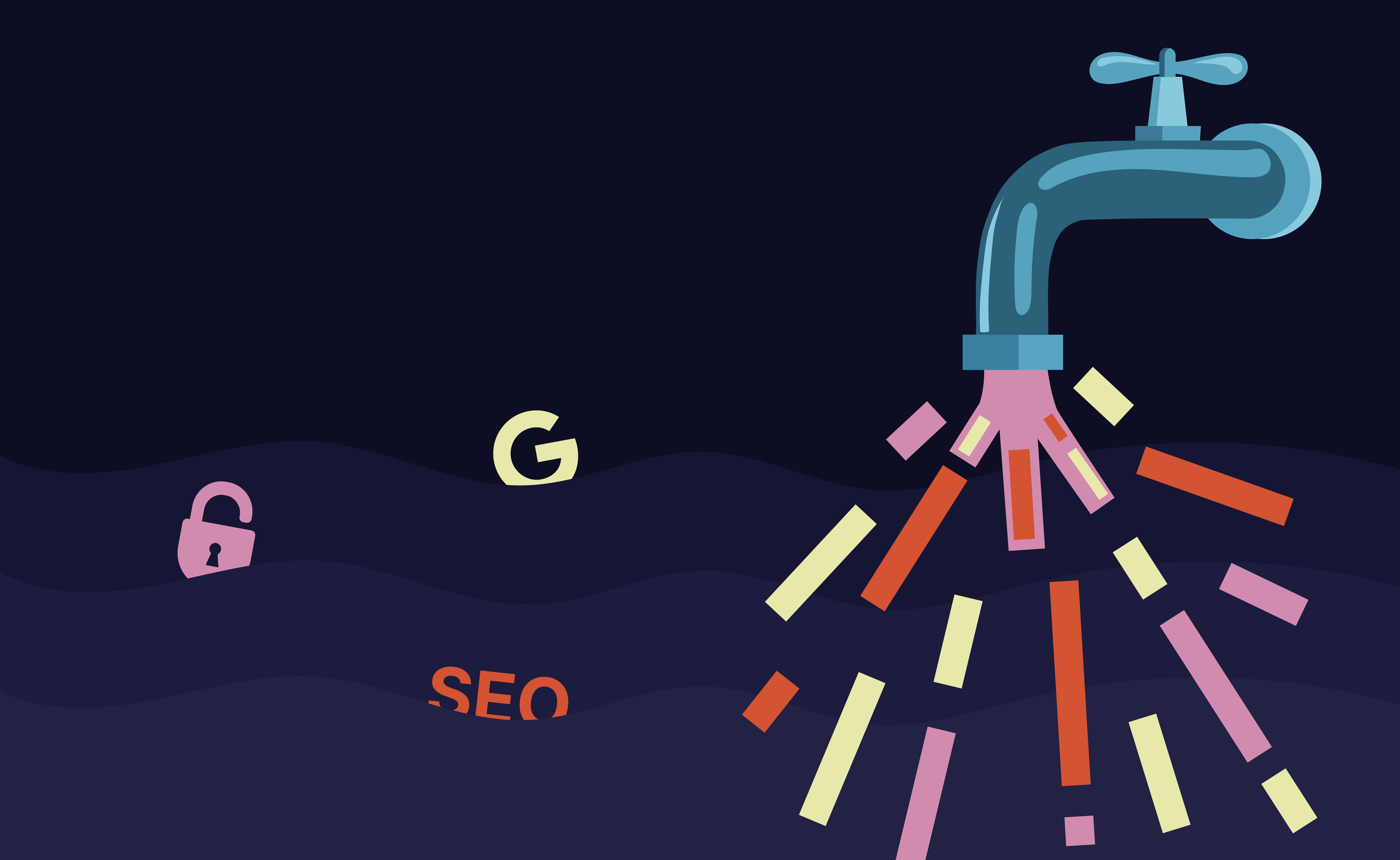The 2024 Google Leak: Why Building Your Brand is Key to SEO Success
Approx 6 min. read

Google's search algorithms have long been a black box. We understand intuitively that Google prefers web pages that are relevant, high quality, and linked to by other high-quality sources. But beyond that, the precise algorithms have always been opaque.
On May 27th, 2024, Rand Fishkin, a worldwide SEO expert, published a blog article about an alleged leaked document he had received. This massive document—over 2,500 pages long—was said to be API documentation from inside Google’s Search division. Some of it was surprising and contradicted official statements from the company.
This leak is significant and will impact the way people do search engine optimization. Still, that leaves several questions:
- Is the leak authentic?
- What does it actually indicate about how search works?
- Most importantly: what does it mean for how you should approach SEO?
Our ultimate takeaway is that branding is more important than ever for SEO success. Let’s dive in and try to understand in more detail.
Is the Leak Authentic?
According to Fishkin, several external sources indicate that the leak is most likely authentic.
He states that several ex-Google employees confirmed that the leaked documents match known internal documentation, or at least highlighted that "someone spent a lot of time adhering to Google's own internal standards for documentation and naming."
Mike King, another SEO expert, also confirmed that "This appears to be a legitimate set of documents from inside Google's Search division."
What Does the Leak Say About How Search Works?
First and foremost: the leak does not explicitly say "This is how Search works" or "We use these exact factors to rank web pages in search engine results."
The leak is a lengthy set of API (Application Programming Interface) documents. An API is a way for multiple computer programs to communicate with each other. API specifications—like the leak—comprise a list of methods and properties that a program can use to interact with another program.
For example, one method listed in the document is numberOfPages, which is called by a program that wants to know how many pages a website has.

Just because a method is listed in an API document does not necessarily mean that it is used somewhere else, or if it is, how it is being used, or even how important it is in ranking websites. It does mean that someone, somewhere, at some time, thought that this would be a useful method to have.
The API documents give us an indirect glimpse at the inner workings of Search. It is possible that some of the methods or properties were created as an idea, or for an experiment, but were subsequently abandoned and are no longer used. But it is doubtful that everything listed is like this.
Also, keep in mind that the leak only concerns Google. They do not apply to other search engines.
Based on the contents of the leaked document, and the data Google collects, there are some likely inferences that we can make.
Google Cares a Lot More About Click Information Than Previously Thought
One major chunk of the document concerns something called Navboost, which is basically a system for collecting and aggregating all the information about what people click on, and when they click on it. Apparently, one of the main reasons why Google pushed Chrome so hard was to get a never-ending stream of click data from most of the internet users in the world.
Some of the related commands in the document include goodClicks, badClicks, and lastLongestClicks.
There's a lot going on here, but the biggest factor is this: if you click on a search result, and immediately go back to the Google search itself, it's implied that Google says "Ok, that's probably not a great search result." If you click on a search result, then read the page for a while, and click on the rest of the website, again it's implied that Google says "Ok, that's probably a good search result."
This is a little creepy, but probably an effective technique for ranking search results. What it means for content is that you want people to click on your content, and then read all of it instead of clicking back. A high volume of low-quality content that nobody reads is practically worthless, even if it has all the keywords and backlinks in the world.
Google Identifies Brands and Authors for Ranking
Another, more scattered, set of methods looks like it identifies legible entities online (brands and authors) and ranks them in terms of importance. This is why Google has increasingly preferred big-name brands in search results while ignoring generic names like buy-nice-furniture.com.
Google has ways of figuring out if your brand is popular and well-known within your industry. If you can attract a following on LinkedIn, YouTube, or anywhere else, Google will take note of search rankings within your niche. For example, it's implied that if you as an author publish dozens of marketing-related articles, Google will factor those pages into rankings for marketing, but it will not affect rankings for something unrelated like cooking.
This means that content matters not just directly for SEO, but also indirectly through brand building. Be sure to leverage social media to your advantage with all the content you publish.
It's not entirely clear just how much this factor matters. However, it seems not having a recognizable brand will definitely hinder your chances of ranking, so it is important to build one.
Should Small Brands Give Up on SEO?
Short answer, no. However, in light of these new findings, it could be worth reallocating the budget (time & money) to other areas and put more focus on brand building.
Our recommendation would be to continue to write good, relevant content on topics in and around your target audience, business, and product, but perhaps not worry so much about buying links. Instead, invest some of that time into Paid Advertising, Social Media, and general brand awareness.
SEO is a marathon, not a sprint, and the leaked documents do not change that. NavBoost, Clickstreams, and other factors take a long time for Google to accumulate data for. In the meantime, you should focus on building credibility and building a treasure trove of valuable content. Regardless of what Google does, it's always a good idea to increase brand awareness.
How Small Brands Should Approach SEO with This Information
SEO is still a viable marketing path for many small brands, but one that should be used alongside other marketing techniques, especially alongside creating brand awareness outside Google.
As the old saying goes, don't put all your eggs in one basket.
Google may not recognize you at all if you don't have an existing brand. And they won't prioritize your website if nobody clicks on it and spends some time reading your content.

That's why we firmly believe that high-quality content is still one of the most effective tools for marketing. It helps to solve a couple of problems made apparent by the leak:
- If you have content that people actually read, that means fewer people will "pogo-stick" back to Google after clicking on it (yes, that is the technical term.)
- If your content is widely read and recognized, that furthers your brand awareness by establishing credibility within your industry, thus making your website more visible to Google.
Key takeaway: Strive to enhance brand awareness for its own sake. Without credibility and reputation in your industry, SEO will be a tough battle to win.
Another, more technical point to keep in mind is to focus on the user experience. Google uses clicks and post-click behaviors as part of its ranking algorithms, so you will benefit if users have an easier time using and staying on your website.
Our Approach to SEO Moving Forwards
Here at Ever Wonder, we're not radically changing how we do SEO. We've always adhered to a strict "create great content" approach and steered clear of "black hat" techniques. Alongside our approach, we leverage industry-leading tools like Ahrefs and Surfer SEO to ensure our strategies are data-driven and comprehensive.

Here's an outline of some actionable insights you might want to deploy if you're not doing so already:
Content
- Continue to focus on a broader set of keywords for content, and utilize these across the site for internal linking.
- Make sure Authors are configured, and assigned, and their relevant social profiles are utilized.
- Create a workflow that promotes the article on all social channels and author channels.
- Make sure anchor text links are relevant to the page that's being linked to. The content on either side of an anchor link has also been shown to help provide context to the link.
- Place the most important information as early as possible.
- In meta titles, placing your target keywords first is still the best move.
- Fresh content is good. Be sure to keep consistent with dates in titles, URLs, and content. For example: "Marketing Trends for 2024." However, it's key to not have a reference to 2023 in the content or to indicate to Google that the document is out of date.
Link Building
- Focus on the quality and relevance of your links instead of the volume.
- Think about internal linking from "lower quality pages." It could be worth only focusing more on your "higher ranking pages" to link internally from.
- Links for high authority press sites will likely yield good returns.
General
- Focus on GA4 engagement rate. This will help with "dwell" time.
- Be sure to focus on website navigation best practices and user experience issues.
- A homepage is key. New pages will lean on the rank of the site's homepage until they get their own ranking.
Summary
There are over 2,500 pages of leaked data. Marketers have barely begun analyzing the whole thing. But those who have taken a look have found that it largely validates what SEO experts have been saying for years: Know what your audience wants, build it, and promote it vigorously wherever you can.
On top of that, your brand, and its awareness and credibility within your industry, play a vital role in ranking. Branding efforts will always pay off. Be honest with yourself: is your brand in the Build, Grow, or Accelerate phase? Once you know that, you'll know how much to invest in SEO.
Want to build your brand presence online? Let’s Talk About Content.
Related posts
Food for thought.

What is WebP and Why is it Important?
by Mat Baxter

How to Optimize Images for Web: A Practical Guide
by Mat Baxter